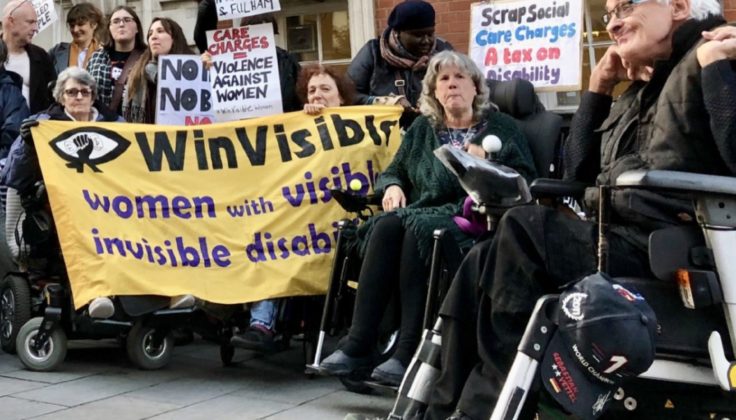Organise a hustings
A hustings is a meeting where election candidates debate policies and answer questions from the audience. A great opportunity to secure commitments and build relationships

What are hustings?
A hustings is a meeting where election candidates or parties debate policies and answer questions from the audience. Hustings provide voters with an opportunity to hear the views of candidates or parties.
Why are hustings important?
Hustings are a great way to secure commitments from candidates, and also an opportunity to build relationships. You can hold them online or in person. You aren’t restricted to a particular format. For example, you could hold a ‘Question Time’ style debate and ask a range of questions focused on issues impacting on Disabled people.
Remember to invite the press and spread the word
Top tips for maintaining political impartiality
- The simplest approach is to invite all political parties campaigning in the election. You only need one candidate from each party
- Allow each candidate or party representative attending a fair chance to answer questions and, where appropriate, a reasonable opportunity to respond to points made against them by other candidates or party representatives
- DDPOs should never support or oppose political parties, elected politicians or candidates for example by calling on people to vote for or against them. You can of course comment on policies and actions of elected politicians and actions of parties in relation to issues impacting on disabled people. Make sure to apply the same standard to different parties
The electoral commission has guidance on organising a hustings which you can find here.
Structure
Below is an outline on how to structure your hustings. This is only a template to help your planning, so adapt it and make it work for you. Our one key tip is to leave ample time for audience questions, as hustings are an opportunity for disabled people to ask direct questions of their potential future representatives.
- Hustings last roughly 90 minutes, or a maximum of 2 hours.
- If you are organising an on-line hustings set up the meeting to start 15 minutes before the public start time, so candidates can get settled and fix any connection problems.
- In the event a candidate can’t join, don’t panic! Ask if their campaign manager can stand in their place. And if worst comes to worst, you could ask them to provide a written statement to be read out.
Welcome (10 mins)
The chairperson gives a brief introduction including zoom guidelines
Introductory remarks from candidates (15 mins).
This can be useful for attendees who aren’t familiar with candidates. You can frame this around an introductory question, such as “what are you going to do about social care if elected?” to ensure they stay on topic.
Questions from the chairperson to candidates (25 mins)
We have listed a set of model questions below which you can draw on
Audience Questions & Answers (20 mins)
You may want to think through how you want to structure the question and answers. For example, you could ask attendees to submit questions at the beginning of the event via the Q&A feature
Closing remarks from candidates (10 mins)
Chairperson closes hustings (5 mins).
At some point during your hustings make sure you ask candidates if they would agree to sign one of the pledges and ask if they’re okay for this information to be public. If candidates agree, take a photo with them holding a printed version of the pledge and post it on social media.
Don’t forget to post photos along with key quotes from candidates on social media during your event using a hashtag. This will allow people who were unable to join your event to follow along. Using the hashtag means the entire network can connect with the event too.
Suggested questions to ask parties and candidates
Good questions are a key part of a hustings as they will allow you to probe candidates’ positions and even secure pledges that you can use to hold elected councillors to account. Below are a set of questions. Make sure to tailor the questions as much as possible to your local context.
- What will you do to increase the volume of genuinely affordable and accessible social housing in this Borough and will you ensure the Disabled Facilities Grant is increased to reflect rising costs?
- Charging for social care is a tax on Disabled people that is forcing more and more Disabled people to go without essential support. Hammersmith &Fulham Council has scrapped this unfair charge – will you do the same?
- How will you support Disabled residents left with no income as a result of benefit changes, delays, and sanctions?
- What measures will you put in place to ensure that there is enough local advice and information available for benefit claimants impacted by the roll out of Universal credit and that this is accessible to Deaf and Disabled people with a range of communication support needs?
- Cuts to social care funding are undermining Disabled people’s dignity, independence, choice and control. How will you ensure social care support needs of local Disabled people are met?
- What will you do to increase the provision of Changing Places toilets to increase Disabled people’s access to the community?
- How will you tackle hate crime and harassment experienced by Deaf and Disabled people in this borough?
- How will you ensure all mainstream schools within the LA area are fully inclusive and do not discriminate against Disabled pupils and students?
- How will you ensure that local transport planning takes into account the needs and views of local Deaf and Disabled people?
- How will you develop and promote co-production with Deaf and Disabled people and DDPOs?
- How will you work with and support the work of local Deaf and Disabled People’s Organisations (DDPOs)?